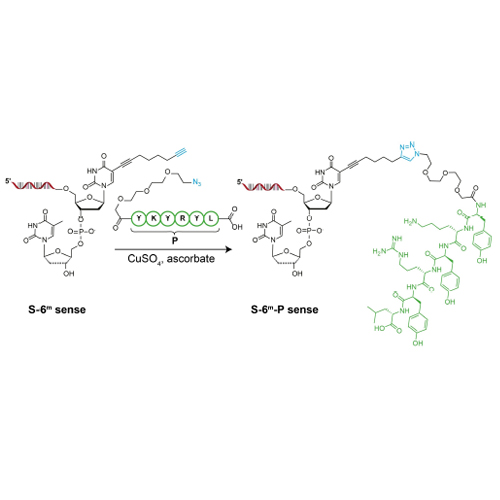Suppression of SARS-CoV-2 Replication with Stabilized and Click- Chemistry Modified siRNAs
2022-07-08
Franziska R. Traube, Marcel Stern, Annika J. Tölke, Martina Rudelius, Ernesto Mejías-Pérez, Nada Raddaoui, Beate M. Kümmerer, Céline Douat, Filipp Streshnev, Manuel Albanese, Paul R. Wratil, Yasmin V. Gärtner, Milda Nainytė, Grazia Giorgio, Stylianos Michalakis, Sabine Schneider, Hendrik Streeck, Markus Müller, Oliver T. Keppler, and Thomas Carell
Angew. Chem. Int. Ed., 61, e202204556, 2022
The emergence of more transmissible or aggressive variants of SARS-CoV-2 requires the development of antiviral medication that is quickly adjustable to evolving viral escape mutations. Here we report the synthesis of chemically stabilized small interfering RNA (siRNA) against SARS-CoV-2. The siRNA can be further modified with receptor ligands such as peptides using CuI-catalysed click-chemistry. We demonstrate that optimized siRNAs can reduce viral loads and virus-induced cytotoxicity by up to five orders of magnitude in cell lines challenged with SARS-CoV-2. Furthermore, we show that an ACE2-binding peptide-conjugated siRNA is able to reduce virus replication and virus-induced apoptosis in 3D mucociliary lung microtissues. The adjustment of the siRNA sequence allows a rapid adaptation of their antiviral activity against different variants of concern. The ability to conjugate the siRNA via click-chemistry to receptor ligands facilitates the construction of targeted siRNAs for a flexible antiviral defence strategy.








